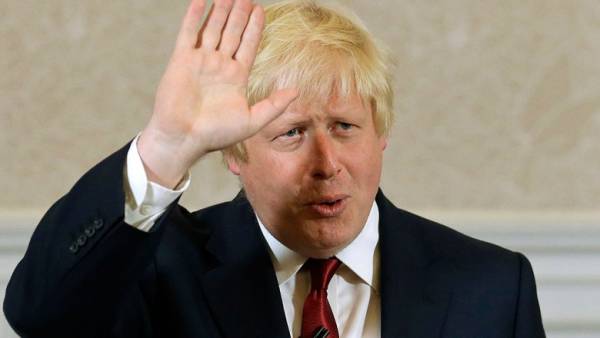Johnson is sure that the refusal to deal with Iran on the nuclear issue would be a mistake
NEW YORK, may 7. /TASS/. Foreign Minister of the United Kingdom Boris Johnson believes that encased in 2015 a deal with Iran on the nuclear issue is the best opportunity to prevent the emergence of Tehran’s nuclear weapons, and concern about Washington can be eliminated.

This is stated in the article Minister published Sunday in the newspaper the New York Times in anticipation of beginning his visit to the United States.
Speaking about the Joint comprehensive plan of action (SVPD), Johnson said: “Of all the possibilities we have to ensure that Iran never gets nuclear weapons, this Treaty has the fewest shortcomings.” “Of course, he has his weaknesses, but I’m sure you can correct them. In fact, now over, to see this happen, the UK is working with the administration [of US President Donald] trump and our French and German allies,” — said the head of the British foreign Ministry.
Tehran will benefit from the abolition of SVPD
Johnson, speaking about the restrictions that were imposed on Tehran, said: “Now that the shackles in place, I do not see the potential benefits to drop them. Only Iran will benefit from the waiver of restrictions on its nuclear program.” “Much better is the most thoroughly enforce the transaction, and until the IAEA certifies that Iran has complied with its conditions, and at the same time, together to resist the aggressive steps of Tehran in the region,” the Minister added.
The Minister of foreign Affairs of the Kingdom said that he agrees with trump’s claims about what Iran’s actions destabilisateur the situation in the middle East.
“The UK shares his concerns about Iran’s support of terrorist groups, his actions in cyberspace, as well as programs for the development of long-range missiles,” — said in the article. As the Minister said, London “has also, of course, agree that Iran should never obtain nuclear weapons.
A common approach to Iran
Johnson said that Washington, London, Paris and Berlin are trying to “develop a common approach to Iran”. Thus, according to him, the attention was focused on “countering Tehran’s interference in the Affairs of the region, reducing missile threat on his part and guarantees that he will never be able to produce nuclear weapons.”
“We all played a role in terms of promoting the property trump to build pressure on North Korea, but this strategy now seems to be bearing fruit, the Minister said. — We share the same concerns about Iran. I believe that we are very close to this state of Affairs, which would solve concern of the President of trump challenges and would be strengthened transatlantic unity”.
“At this stage, which is crucial, would be a mistake to reject the deal on the nuclear issue, and to remove limitations imposed on Iran, concluded Johnson. — One thing for sure, any alternative is the worst option. It would be wiser to strengthen the chains, not break them.”
The deal
AGREEMENT — agreement reached with Iran by the five permanent members of the UN Security Council (Russia, UK, China, USA, France) and Germany in July 2015 and entered into the implementation phase in January 2016. In response to the lifting of sanctions before the UN security Council, the US and the EU, Iran undertook to limit its nuclear activities, putting it under international control.
Trump has repeatedly claimed that the AGREEMENT did not prevent the possibility of Iran developing nuclear weapons, but only delayed the day when Tehran will receive it at your disposal. 12 January 2018, the President warned that Washington will cease participation in the AGREEMENT, if it is not amended. He recalled that further extended the lifting of sanctions against Iran, however, according to him, this was done “merely to conclude an agreement with European allies, to fix the terrible flaws of the Iranian nuclear deal.”